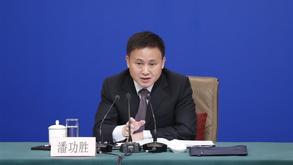 In this file photo dated March 10, 2019, Deputy Governor of the People's Bank of China Pan Gongsheng attends a press conference on the financial reform and development for the second session of the 13th National People's Congress (NPC) in Beijing, capital of China. (PHOTO / XINHUA)
In this file photo dated March 10, 2019, Deputy Governor of the People's Bank of China Pan Gongsheng attends a press conference on the financial reform and development for the second session of the 13th National People's Congress (NPC) in Beijing, capital of China. (PHOTO / XINHUA)
SHANGHAI - The exchange rate of the Chinese currency renminbi, or the yuan, is expected to remain stable, with two-way fluctuations becoming normal, said Pan Gongsheng, deputy governor of the People's Bank of China (PBOC) Thursday.
The stability of the yuan's exchange rate is better than other currencies, and transactions in China's foreign exchange (forex) market have been rational and orderly, Pan said at the Lujiazui Forum in Shanghai.
The stability of the yuan's exchange rate is better than other currencies, and transactions in China's foreign exchange (forex) market have been rational and orderly, said Pan Gongsheng, deputy governor of the People's Bank of China
Pan said that China's sustained economic recovery has contributed to the generally stable yuan.
The change in the exchange rate of the yuan is subject to multiple factors at home and abroad, Pan said. He added that China's consolidated growth momentum, normalized monetary policies, and a more mature forex market have helped underpin the yuan's stable exchange rate.
Pan also cautioned that uncertainties in the world, including uneven global recovery, rising inflation pressure, and a fragile financial market, might affect exchange rates in the future.
Stressing the importance for enterprises to cope with two-way fluctuations, Pan urged market entities to adapt to it, arrange their currency structure prudently, and refrain from currency speculation.
ALSO READ: China's forex regulator: Range of RMB rise to remain reasonable
To help firms lower risks from exchange rate fluctuations, China will establish an open and competitive forex market, improve market transparency, and strengthen prudent macro-management, Pan said.
He also said China will deepen the reform of foreign exchange administration and advance the liberalization and facilitation of cross-border trade and investment.
The country will enhance cross-border trade facilitation under the current account and steadily promote the high-level opening-up of the capital account, said Pan.
He said China will diversify products as well as domestic and foreign participants in the foreign exchange market, and promote cross-border investment reform of private equity funds.
More efforts will be made to facilitate enterprises' cross-border financing, and support cross-border payments of new trade patterns such as offshore trade and cross-border e-commerce, he added.
"In the near future, we will pilot high-level opening-up of foreign exchange management in the Lingang area, a new section of the Shanghai pilot Free Trade Zone, the Guangdong-Hong Kong-Macao Greater Bay Area and the Hainan free trade port," said Pan.
READ MORE: Bay Area throbs with financial innovation
The operation of Chinese foreign exchange reserves follows market-based principle, and promotes the stability and development of the international financial market, said Pan, adding that the country's forex holdings will take sustainable investment as its long-term goal.


